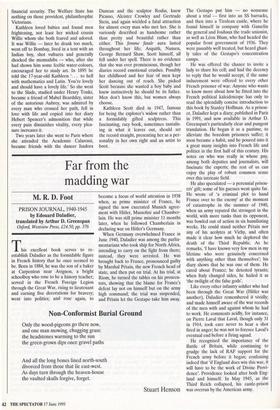Far from the madding war
M. R. D. Foot
PRISON JOURNAL, 1940-1945 by Edouard Daladier, translated by Arthur D. Greenspan Oxford, Westview Press, £24.50, pp. 376 This excellent book serves to re- establish Daladier as the formidable figure in French history that he once seemed to be. Born in 1884, he was the son of a baker at Carpentras near Avignon, a bright schoolboy who rose to be a history teacher; served in the French Foreign Legion through the Great War, rising to lieutenant and earning five decorations for bravery; went into politics; and rose again, to
become a focus of world attention in 1938 when, as prime minister of France, he signed the now execrated Munich agree- ment with Hitler, Mussolini and Chamber- lain. He was still prime minister 11 months later, when he followed Chamberlain in declaring war on Hitler's Germany.
When Germany overwhelmed France in June 1940, Daladier was among the parlia- mentarians who took ship for North Africa, intending to carry on the fight from there; instead, they were arrested. He was brought back to France, pronounced guilty by Marshal Main, the new French head of state, and then put on trial. At his trial, at Riom, he turned the tables on his prosecu- tors, showing that the blame for France's defeat lay not on himself but on the army high command; the trial was suspended, and Pdtain let the Gestapo take him away.
Non-Conformist Burial Ground
Only the wood-pigeons go there now, and one man mowing, chugging grass: the headstones warming to the sun the green-grown dips once gravel paths And all the long bones lined north-south divorced from those that lie east-west. As days turn through the heaven-house the vaulted skulls forgive, forget.
Stuart Henson
The Gestapo put him — no nonsense about a trial — first into an SS barracks, and then into a Tirolean castle, where he found himself in company with Gamelin the general and Jouhaux the trade unionist, as well as Leon Blum, who had headed the popular front government of 1936. They were passably well treated, but heard ghast- ly tales of the Gestapo's concentration camps.
He was offered the chance to invite a lady to share his cell; and had the decency to reply that he would accept, if the same inducement were offered to every other French prisoner of war. Anyone who wants to know more about how he fitted into the French political kaleidoscope has only to read the splendidly concise introduction to this book by Stanley Hoffman. As a prison- er, Daladier kept a diary; published in Paris in 1991, and now available in Arthur D. Greenspan's particularly clear and pungent translation. He began it as a pastime, to alleviate the boredom prisoners suffer; it soon became a habit, and he poured into it a great many insights into French life and politics in the first half of this century. His notes on who was really in whose pay, among both deputies and journalists, will fascinate the experts; the rest of us can enjoy the play of robust common sense over this intricate field.
He also speculated — a perennial prison- ers' gift; some of his guesses went quite far. He wrote of 'a criminal plot to hand France over to the enemy' at the moment of catastrophe in the summer of 1940, when an army reputed the strongest in the world, with more tanks than its opponent, was bowled out of action in six humiliating weeks. He could stand neither Main nor any of his acolytes at Vichy, and often made it clear how much he deplored the death of the Third Republic. As he remarks, 'I have known very few men in my lifetime who were genuinely concerned with anything other than themselves'; his diary shows that he was one of them. He cared about France; he detested tyrants; when Italy changed sides, he hailed it as `the twilight of the false gods'.
Like every other infantry soldier who had been through the Great War (Hitler was another), Daladier remembered it vividly; and made himself aware of the war records of the men with and against whom he had to work. He comments acidly, for instance, on Pierre Laval that Laval, though only 31 in 1914, took care never to hear a shot fired in anger; he was not to foresee Laval's eventual end before a firing squad.
He recognised the importance of the Battle of Britain, while continuing to grudge the lack of RAF support for the French army before it began; confessing indeed that 'if England does win this war, it will have to be the work of Divine Provi- dence'. Providence looked after both Eng- land and himself. In May 1945, as the Third Reich collapsed, his castle-prison was overrun by the American army.


































































 Previous page
Previous page